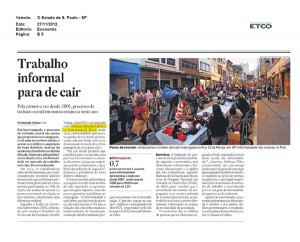Informal work stops falling
Estadão - 27/11/2012
For the first time since 2001, the process of mass social inclusion has stopped this year
The mass social inclusion process was interrupted, which led to the emergence of a new middle class, access to credit and the acquisition of durable goods, marks of the Brazilian economy in the last decade. This year, for the first time since 2001, informality in the labor market has not dropped. It was unchanged.
In 2012, workers without a formal contract, who traditionally receive lower wages than formal workers, remained with practically the same participation in the GDP, of 16,9%, an advance of only 0,1 percentage point in relation to the previous year, considered a residual difference.
According to the Underground Economy Index (IES), prepared by the Brazilian Institute of Economics of the Getúlio Vargas Foundation (Ibre / FGV) in partnership with the Brazilian Institute of Competitive Ethics (ETCO) since 2003, informality dropped by 0,7 percentage point every year since 2007, having retracted by 1,2% from 2009 to 2010.
“There is a parallel Brazil that contributes to the economy, but on the outside. It occurs more in the universe of micro and small companies, however, it compromises the balance of the business environment ”, highlighted the president of Etco, Roberto Abdenur.
As an underground economy, the survey understands any activity that is not reported to the government, which does not generate taxes, nor does it guarantee workers any labor. “Informality is a fever, a symptom of the disease, not the disease itself. Therefore, the solution is not related to the tightening of inspection, to the extinction of informality, because its reverse is not formalization. It is necessary to attack the causes ”, analyzed the researcher from Ibre / FGV, responsible for preparing the IES, Fernando Barbosa Filho.
Barriers
The limitation of the informality retraction process, according to the economist, is directly related to educational barriers and the rigidity of labor laws, according to Barbosa. It is based on statistics from the National Household Sample Survey (Pnad), from IBGE, to conclude that the growth in the number of employees with a formal contract of 10 percentage points, in the period from 2002 to 2011, was directly related to the advance of schooling of the population.
“The increase in the 22 million people who have been educated, according to PNAD, accounts for 64% of this drop (in informality)”, noted Barbosa Filho, adding that an even greater advance in the level of education of the Brazilian population would also have an effect on the sector Currently, the service provider is primarily responsible for the growth of the labor market and is recognized for having a higher degree of informality than the industry.
Although stationary, the underground economy in Brazil is still inferior to that of neighboring countries, but it far surpasses that of developed countries, such as the United States.




